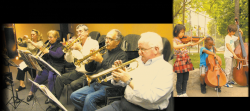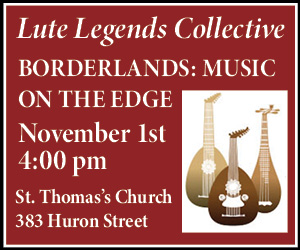There is mounting scientific evidence to substantiate what just about everyone who has studied music knows to be true, that making music makes a difference to the quality of one’s life. Studies now abound indicating that playing an instrument causes the cerebellum to develop in ways that it just doesn’t in the absence of music, that music makes us more intelligent, prevents the deterioration of mental functions in the elderly and that it makes a difference in the way we relate to one another.
“If you put an instrument in the hands of a child, he will never pick up a gun,” said Dr. José Antonio Abreu, founder, El Sistema.
 I am reminded of one Valent Lesso, a multi-talented Toronto musician who traded his violin in for a handgun at a pawn shop, changed his name to Steve Suchan and joined the notorious Boyd gang around 1950. He subsequently shot and killed a Toronto policeman. It seems Suchan’s need to belong to a gang outweighed his love of music.
I am reminded of one Valent Lesso, a multi-talented Toronto musician who traded his violin in for a handgun at a pawn shop, changed his name to Steve Suchan and joined the notorious Boyd gang around 1950. He subsequently shot and killed a Toronto policeman. It seems Suchan’s need to belong to a gang outweighed his love of music.
This need to belong is central to the thinking behind El Sistema, the ensemble-based music instruction method developed in Venezuela by Abreu. It is significant that El Sistema rejects the “traditional” method of one-on-one instruction and daily solitary practice, in favour of group instruction five days a week for three hours. Co-operation, collaboration and mutual support are front and centre in the method.
El Sistema’s most tangible goal is to train musicians. To say that it has been successful in this endeavour is an understatement: Gustavo Dudamel, a graduate of the program and now the conductor of the Los Angeles Philharmonic Orchestra, is only one of many examples of this success. Its mission, however, goes well beyond this goal. Sistema Toronto’s mission, for example, is “to build and sustain an intensive social program ... to inspire children at risk to realize their full potential as students, musicians and citizens.” In Abreu’s words, “The huge spiritual world that music produces in itself overcomes material poverty. From the minute a child is taught how to play an instrument, he or she is no longer poor.” El Sistema sees itself not primarily as a music program but as a social development program that uses music as a way of transforming children by teaching them the habits, attitudes and practices of people who lead fulfilling and successful lives.
Abreu was awarded the Glenn Gould Prize in 2009. A little less than two years later, in September 2011, the fledgling El Sistema Toronto began its first classes.
New Horizons: Although music education in Ontario public elementary and secondary schools has generally lacked the intensity of El Sistema’s three hours a day it used to have a profound effect on many who experienced it. Out of this past success a new and equally remarkable musical enterprise has come into existence, the New Horizons Band program, under the direction of retired music teacher, Dan Kapp, now in its fourth year at Long and McQuade’s Bloor Street complex. The concept, Kapp told me, is “a safe group environment where mature/retired adults can come to learn to play a musical instrument for the first time or reconnect with one they haven’t played in decades.” With bands at three different levels, ranging from absolute beginners to advanced players, the average age is about 60, with members as young as 36 and as old as 90. What motivates them to participate, according to Kapp, is “their love of playing music in a band,” going back decades to their “fond memories of band in high school, the excitement of performing, travelling, close friends and the sense of accomplishment when you get a hard passage under your fingers.”
“Playing a musical instrument is one of the very few things you can do that engages the whole mind at one time. It involves and develops memory, problem-solving, physical co-ordination, gross and fine motor skills, muscle use, lung capacity, mental focus/attention span and self-discipline. It also addresses the need to care for our emotional well-being, self-esteem, self-worth, and social interactions with friends who genuinely care for you.” Many of the mature adults in Dan’s bands acquired skills and habits in high school band classes that have helped them throughout their lives. They are participating in his programs in order to continue to develop those skills and habits. It’s too late for Steve Suchan, but if you’re reading this, it’s not too late for you!
So the New Horizons program grows and thrives: “In the short term we are making sure the program is addressing the needs and expectations of our members, so that the NHB remains an exciting and welcoming place to make music. In the mid-term we are planning a big trip to Europe for the summer of 2015 and the long-term goal is to stabilize the program at seven bands. Perhaps, somehow, a fourth goal could be to make the public aware of the value of music as a part of every child’s education.
Because while the evidence grows that music has an important role to play in the development of the mind, music programs in our schools continue to be cut, with the support of an administration and populace woefully out of touch with the facts. It looks as if you can either have music or “special education,” and if you don’t have the former then you will need the latter.
What, I asked, can be done to “stop the rot” in public school music education? The attitude that needs to be changed, Dan observed, held both by parents and educational administrators, is that “it’s just music,” and it’s not important. He was once told that his weekly time with his grade 7 and 8 music classes was being rolled back because “they were getting too much music.”
Dan thinks the only thing that can stop the erosion of school music programs is parents. Only when they see that the lack of music in the school system is hurting their kids in the long term and only if they demand its restoration, will anything happen.
The truth of Dan’s observation has already been noted in September’s “Education Watch” when a June groundswell of community murmuring stopped the Toronto District School Board from cutting funding for itinerant music teachers. One powerful voice was that of the Coalition for Music Education. The article quotes from the Coalition’s public statement opposing the proposed cuts. (Read it online at thewholenote.com, or on page 57 of the September issue).
But there is much each of us can do to make a difference to the state of music education. The coalition’s website (musicmakesus.ca) offers resources to support the cause. There’s an advocacy video, a message which can be printed in concert programs (or in music magazines), an order form for program inserts, a page where you can sign up as a supporter, an invitation to apply to serve on the board of directors of the organization, and much more.
So please, don’t just read this. Go to the Coalition’s website and get yourself up to speed on the state of music in the public education system.
And while you’re at your computer vote for El Sistema Toronto’s bid for the Aviva Community Fund. And then vote every day, for 10 days. It takes minutes. Together we can make a difference.
SISTEMA TORONTO IS COMPETING in the Aviva Community Fund, an annual competition in which several charities and community groups across Canada share in a $1 million prize. Sistema is in the running for $150,000, which would be a major boost in its efforts to sustain its two current “Playing to Potential” programs, and to expand them to other GTA neighbourhoods. Winning the award is determined by popular support from voting online from December 2 to 11. Anyone can vote by going to the main Aviva Community Fund webpage. You’ll need Sistema’s contest code which is ACF16874. Each voter gets ten votes – one for each day of the campaign – so voting every day is essential. Voting ends at 12:00 midnight on December 11.
Allan Pulker is chairman of the board of The Wholenote.



